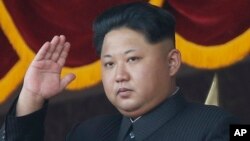North Korea’s purported nuclear test might be an attempt to seek attention from the United States, a former U.S. envoy said.
The announcement that the communist country successfully tested a hydrogen bomb came as a surprise, prompting analysts to wonder what might have motivated Pyongyang to make the provocative move. Some say internal politics might have played a role in the decision, and others cite deteriorating ties between North Korea and China, adding Pyongyang did not notify its ally of the test in advance.
Bill Richardson, former U.S. ambassador to the U.N. who extensively dealt with North Koreans, told VOA Wednesday Pyongyang’s sudden move might be aimed at steering Washington’s attention toward it.
Seeking attention
“We’re still around. I know you are all worried about the Middle East, Iran and Saudi Arabia, but we still are here in Northeast Asia,” said the former ambassador, meaning that's what North Korean officials are likely thinking.
Richardson said Pyongyang's message to Washington is this.
“We are not going to give up our nuclear proliferation. We are not going to give up developing nuclear weapons. This is our fourth and you need to deal with us,” the envoy said.
The former ambassador called on Washington to change its approach to Pyongyang, saying the current policy has failed to stop Pyongyang’s nuclear development.
“Sanctions, strategic patience have not moved North Korea to stop developing their nuclear weapons,” he argued.
Instead, Richardson called for fresh diplomatic efforts involving key members of the Six-Party Talks, multi-state nuclear talks, in what he called a “readjustment” of the policy.
Richardson’s comments came amid criticism that the United States might have overlooked the North Korean nuclear issue while trying to resolve disputes over Iran’s nuclear development.
Some critics noted President Barack Obama did not mention the nuclear test when he laid out U.S. foreign policy’s priorities in his highlighted State of the Union address this week.
North Korea overlooked?
The White House dismissed the criticism, saying the North Korean nuclear issue is a “huge priority” to the president.
“If there’s one thing I know about the leader of North Korea, he likes attention” Ben Rhodes, Obama’s deputy national security adviser, told reporters in reference to Obama’s speech.
“We didn’t particularly feel compelled to give him that attention,” added Rhodes.
Despite North Korea’s apparent unwillingness to give up nuclear weapons, there are still incentives for Pyongyang to negotiate away the weapons, according to Richardson.
“I do believe they have an incentive. I think North Korea realistically has to find ways to improve their economic life,” the envoy said.





